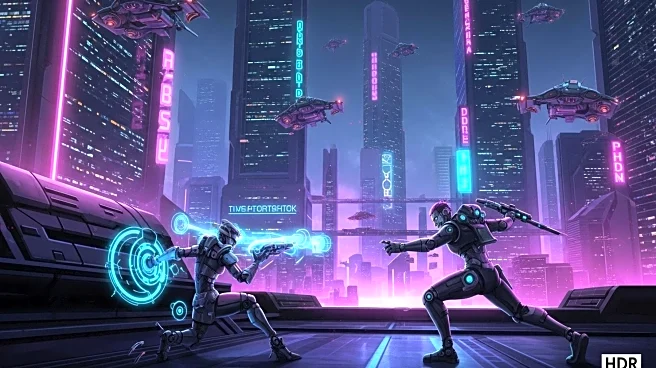What is the story about?
What's Happening?
Ananta, a video game developed in China, has been showcased at the Tokyo Game Show, drawing attention for its unique blend of gameplay elements reminiscent of popular games like GTA, Batman Arkham, and Uncharted. The game features a variety of characters, including a bunny girl named Taffy and a purple-haired cop named Lykaia, each with distinct abilities and mechanics. Ananta allows players to switch between characters using a phone interface, similar to GTA-5, and includes mechanics such as web-swinging, car chases, and telekinetic powers. The game has been described as a maximalist approach to game design, incorporating numerous popular game mechanics into a single experience.
Why It's Important?
Ananta's development highlights China's growing influence in the global gaming industry, particularly in the realm of triple-A game production. By integrating elements from various successful games, Ananta aims to capture a wide audience and showcase China's capability to produce complex and engaging video games. This could lead to increased competition in the gaming market, potentially influencing game design trends and encouraging innovation. The game's unique approach may also attract attention from gamers seeking novel experiences, thereby impacting the popularity and sales of similar games.
What's Next?
As Ananta continues to gain attention, it may lead to further developments in the gaming industry, including potential collaborations or adaptations of its mechanics in other games. The reception of Ananta at the Tokyo Game Show could influence its future marketing strategies and release plans. Additionally, the game's success may encourage other developers to explore similar maximalist approaches, potentially leading to a shift in game design philosophies.
Beyond the Headlines
Ananta's approach to game design raises questions about the balance between originality and borrowing elements from existing games. The inclusion of diverse mechanics and characters may challenge traditional game narratives and encourage players to explore new forms of storytelling. Furthermore, the game's development reflects broader cultural exchanges between China and other countries, potentially influencing perceptions of Chinese creativity and innovation in the gaming industry.
















